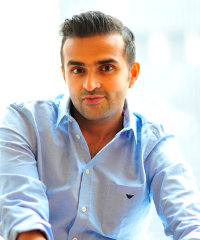Advancing Africa’s youth: Ashish Thakkar and others debate formal education
At the World Economic Forum on Africa, held in Nigeria’s capital Abuja last week, a group of African leaders discussed how the continent’s massive youthful population (almost 200m people aged between 15 and 24) is shaping the future of the continent.
One of the points debated was the role of formal education in developing Africa’s youth.
Ashish J Thakkar, the celebrated 32-year old entrepreneur and founder of the diversified Mara Group, was one of the panellists for the discussion. Thakkar left school at the age of 15 to start his business and while he noted that everyone’s circumstances are different, he believes that more emphasis should be placed on mentorship.
“I believe that things like mentorship are a lot more important than education because it is more practical. I mean what you could learn from your teacher in school and what you can learn from Kola Karim (CEO of Nigerian conglomerate Shoreline Energy International) is completely different… He will teach you what the practicalities are. If he’s your mentor he will guide you in the right way with the realities of today.”
Thakkar added that while there is a gap in education that needs to be addressed, mentorship is a more valuable tool than education.
Karim was also sitting on the panel and commented that, as an employer, there needs to be a distinction between formal and informal education.
“As an employer looking down, for me the most important thing is employing people who are employable, and [secondly] employing people who have that critical thinking methodology, who can apply themselves. So you could have a formal education, even a PhD, and you are absolutely useless. You could be informally educated but a critical thinker,” continued Karim.
“So the balance as an employer is being able to evaluate people for themselves and how they present themselves [concerning] what value they will add in what you are doing.”
Changing mindsets around tertiary education
During the discussion it was noted that some of the panellists were working in fields that were not necessarily related to what they studied at tertiary level.
Esi Cleland, co-founder and CEO of a leading manufacturer and retailer of affordable clothing in Ghana, AfroChic Limited, was asked how she felt her formal education had led her to where she is today. Cleland studied a degree in physics at Smith College, a women’s college in the US.
“I think education, when we think of education the traditional way that it has been conducted, may be overrated. But learning is not,” she emphasised. “And the spaces where that learning happens, it is important to cultivate them.”
Cleland said she hadn’t considered herself to be a leader before she attended college and a lot of this had to do with being in an environment of motivated and passionate women.
“It wasn’t really what I learnt in my physics classes, but what I learnt from being in that community of smart, motivated women that made me ask myself: ‘Well, what do I care about?’ And I think that was the beginning for me of trying to find my place in the world… So yes, I studied physics but I think the emphasis was always that you were learning how to solve problems,” she explained.
“When I came back [to Ghana] I thought, what problems do we have? In other parts of the world their problem might be trying to put a man on the moon. Our problems are food, clothing, shelter… So am I using my physics? Yes, I am using the skills that I learnt about how to solve problems in my environment.”
Another panellist, Zamantungwa Khumalo, co-founder of Africa Unleashed in South Africa, argued that there needs to be a shift concerning education.
“A lot of us go to university particularly to get jobs… We shouldn’t be going to universities necessarily to get jobs. But it is about how you are learning how to think. Is a culture of thinking cultivated while you are there? And I would say it’s not because far too often you are judging students on what percentage they get,” noted Khumalo.
“I know it’s not so much applicable in certain fields, for example engineering where you actually learn processes. But something like the humanities, why is it that philosophy isn’t emphasised more? Because that teaches you critical thinking and that is a skill you use irrespective of where you work.”
However, Khumalo added that more needs to be done to allow access to education, most notably for women.


